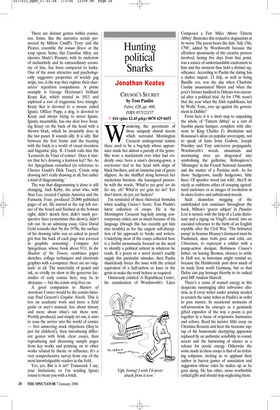Hunting political Snarks
Jonathan Keates
CRUSOE’S SECRET by Tom Paulin Faber, £20, pp. 400, ISBN 057122157 ✆ £16 (plus £2.45 p&p) 0870 429 6655 Wandering the pavements of those uniquely dismal streets which surround Mornington Crescent underground station there used to be a bag-lady whose appearance made her almost a parody of the genre. She wore a mackintosh over what had evidently once been a man’s dressing-gown, a sou’wester tied to her head with strips of black bin-liner, and an immense pair of green slippers. As she shuffled along between her mysterious burdens, she harangued passersby with the words, ‘What’re yer goin’ ter do fer me, eh? What’re yer goin ter do? Yer don’t know, do yer, yer fuckers!’ I’m reminded of these rhetorical formulas when reading Crusoe’s Secret, Tom Paulin’s latest collection of essays. He is the Mornington Crescent bag-lady among contemporary critics, not so much because of his language (though this has recently got him into trouble) as for the exigent self-absorption of his approach to books and writers. Underlying most of the essays collected here is a fretful monomania focused on the need to identify a political subtext in whatever he reads. If a poem or a novel doesn’t readily supply this particular stimulus, then Paulin shamelessly forces the issue with the critical equivalent of a half-nelson or knee in the groin to make the work behave as required.
Ominously entitled ‘A Republican Cento’, his examination of Wordsworth’s ‘Lines Composed a Few Miles Above Tintern Abbey’ illustrates this reductive dogmatism at its worst. The poem bears the date ‘July 13th, 1798’, added by Wordsworth because the effortless spontaneity of the creative process involved, lasting five days from that point, was a source of understandable excitement to him and the moment thus held a distinct significance. According to Paulin the dating has a darker import. 13 July, as well as being Bastille eve, was the day when Charlotte Corday assassinated Marat and when the poet’s former landlord in Orleans was executed after a political trial. As for 1798, wasn’t that the year when the Irish republicans, led by Wolfe Tone, rose up against the government in Dublin?
From here it is a short step to unpacking the whole of ‘Tintern Abbey’ as a sort of Jacobin picnic hamper, complete with allusions to King Charles I’s absolutism and Rousseau’s ideas on popular sovereignty, not to speak of hints from Godwin, Joseph Priestley and Tory anti-terror propaganda. Wordsworth’s woods, mountains and murmuring river are dragooned into symbolising the guillotine, Robespierre’s ‘Montagne’ in the French National Assembly and the mutter of a Parisian mob. As for those ‘hedgerows, hardly hedgerows, little lines/ Of sportive wood run wild’, they’ll do nicely as emblems either of creeping agricultural enclosure or as images of revolution in its more festive and unbuttoned moods.
Such shameless mugging of the undefended text continues throughout the book. Milton’s ‘graver subject’ in Paradise Lost is turned, with the help of a Latin dictionary and a zigzag via Virgil’s Aeneid, into an encoded reference to the birth of an English republic after the Civil War. ‘The helmeted pump’ in Seamus Heaney’s farmyard must be Paulinised, since both poet and critic are Ulstermen, to represent a soldier with a pump-action shotgun. Robinson Crusoe’s father, on leaving Bremen, chooses to settle in Hull not, as historians might remind us, because the Humberside port drew much of its trade from north Germany, but so that Defoe can pay homage thereby to its radical poet MP Andrew Marvell.
There’s a sense of wasted energy in this desperate rummaging after subversive allusion, as if every writer under scrutiny needed to scratch the same itches as Paulin’s in order to pass muster. In occasional moments of self-possession he emerges as a genuinely gifted expositor of the way a poem is put together in a tissue of responsive harmonies and echoes. Read his incisive little essay on Christina Rossetti and hear the tiresome taptap of his homemade decrypting apparatus replaced by an authentic sensibility to sound, accent and the harnessing of silence as a release for poetic energy. Otherwise the noise made in these essays is that of an irritating solipsism, inviting us to applaud their author in barren games of association and suggestion whose rules he makes up as he goes along. He has other, more worthwhile critical gifts and should stop neglecting them.





































 Previous page
Previous page